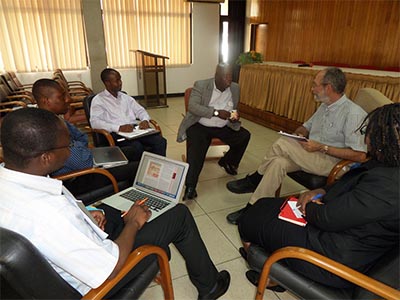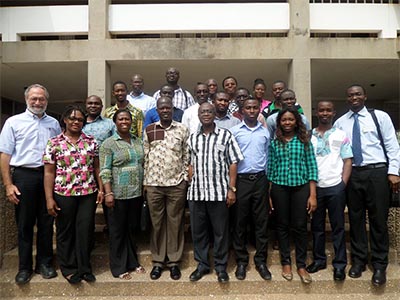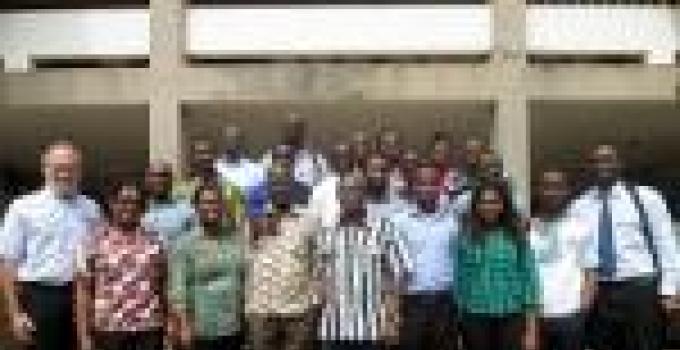As part of activities to improve knowledge in assessing external funds for research, the Office of Grants and Research (OGR) and the College of Health Sciences organized a three-day workshop on the theme Demystifying NIH Grant Applications: Paths to Successful Grant Writing in the “Big Leagues” for researchers drawn from the Colleges of Science and Health Sciences. The workshop took place from the 7th – 9th January 2015 at the Great Hall Conference Room.

The Resource Person was Prof. Thomas Robins from University of Michigan, USA. Other in-house facilitators were Prof. Peter Donkor, Director, Office of Grants and Research, Prof. Tsiri Agbeyenga, Provost, College of Health Sciences Dr. Sam Newton, Department of Community Health, Dr Ellis Owusu Dabo, Director, KCCR and Ms Nadia Tagoe, Grants and Research Manager, Office of Grants and Research. Participants were taken through the structure of the National Institutes of Health (NIH) and the strategy for winning NIH grant. They were also provided with on-line resources for NIH grant application and mentored for two and half days on the application process. He pointed out that the various research grants include Research training and fellowship grants, Pre development Awards Grants and Research grants. He also said that there are three (3) applications deadlines in every year for unsolicited applications.
For eligibility issues, he opined that NIH will usually specify which institutions and Principal Investigators qualify. Applications can choose to have a single Principal Investigator or if it can be reasonably justified, multiple Principal Investigators. He also advised that applicants should liaise with Programme Officers in the relevant institutes in NIH during the application process. He added that these Officers usually give advice about what NIH is looking for. He further explained the NIH review process. He noted that proposal reviews are usually done by scientific committees during the peer review process. The Committee recommends which of the proposals should be funded. He added that the review process used at NIH is a very fair process.
Ms Nadia Tagoe on the other hand took participants through the administrative processes of NIH grant writing. She said that applications must be submitted through the grants.gov and eRA Commons system which is the institution that keeps records of all applications. She also addressed some potential sinkers which included Page limits, Paper size, type face, font size, and signature by authorized persons. She noted that researchers should avoid putting vital information in the appendices of their proposals as reviewers are not obliged to read the appendices of proposals. She emphasized that researchers should also allow themselves time for correcting errors and should therefore submit their proposals at least two days before deadline.

She entreated researchers to work hand in hand with the Office of Grants and Research.
The second and third days of the workshop were devoted to group activities on proposal writing and presentations respectively. The group activity was facilitated by Prof. Peter Donkor, Prof. Tsiri Agbenyenga, Dr Ellis Owusu Dabo and Dr Sam Newton. The workshop recorded thirty-four participants.

